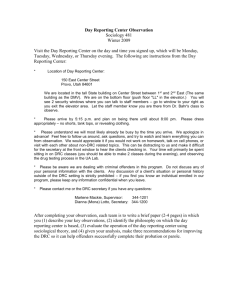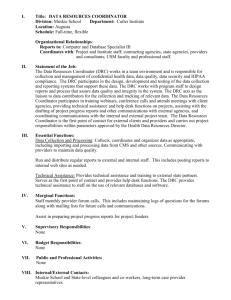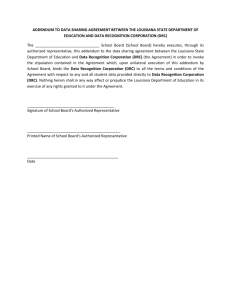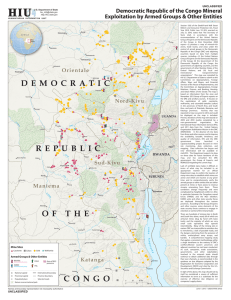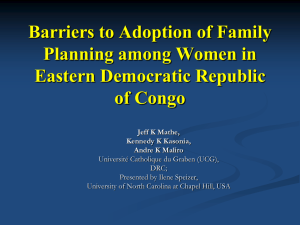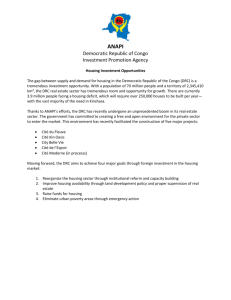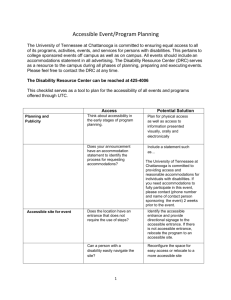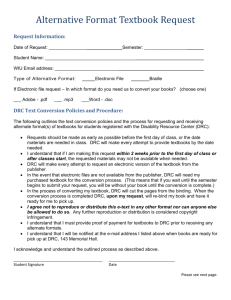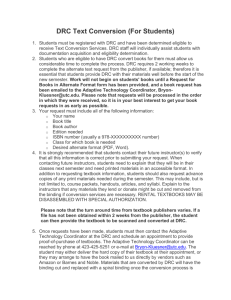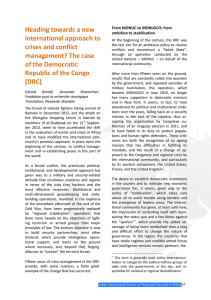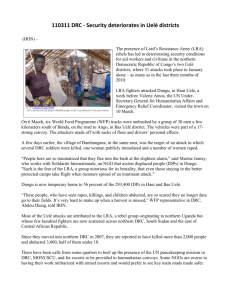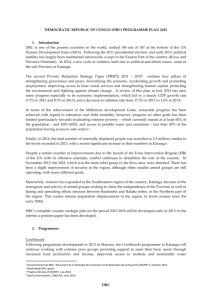Natural Resources and Conflict in Africa
advertisement
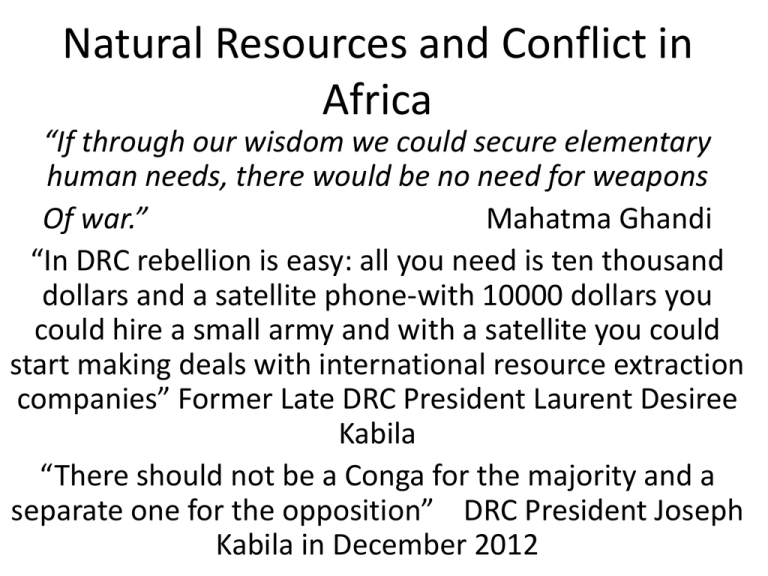
Natural Resources and Conflict in Africa “If through our wisdom we could secure elementary human needs, there would be no need for weapons Of war.” Mahatma Ghandi “In DRC rebellion is easy: all you need is ten thousand dollars and a satellite phone-with 10000 dollars you could hire a small army and with a satellite you could start making deals with international resource extraction companies” Former Late DRC President Laurent Desiree Kabila “There should not be a Conga for the majority and a separate one for the opposition” DRC President Joseph Kabila in December 2012 Terms and Concepts The Organization for Economic Co-operation and Development (OECD), defined natural resources as “natural assets (raw materials) occurring in nature that can be used for economic production or consumption (ACCORD 2009). An armed conflict, according to Uppsala Conflict Data Programme (UCDP2008 in ACCORD 2009), is contested incompatibility which concerns government and/or territory where the use of armed force between two parties, of which at least one is the government of a state, resulting in at least twenty-five battle related deaths in a calendar year. Terms and Concepts Cntd • Peacebuilding according to Schellhass & Seegers (2006) refers to efforts intended to avoid a relapse into conflict and this opposed to peacekeeping-activity to ensure compliance to the conflict agreement. The same authors also refer to peace making as the activity of bringing warring parties to an agreement. Natural Resources-Conflict Nexus • Consider the role factors and actors in natural resources exploitation, extraction/harvesting and consumption. • Africa is known as a continent that is steeped in armed conflict and instability, the causes of which are both diverse and endemic • The perpetuations of conflicts in Africa over its natural resources can be blamed on African leadership and the sinister political and economic interests of the developed world Natural Resources-Conflict Nexus-Cntd • Rich natural resources are taken away from the African continent at a fraction of their value • The vast seepage of the net value of African natural resources into developed nations are a cause of concern to countries like the DRC where such resources are looted. • In many of the protracted conflicts in Africa, the control, access, and distribution of natural resources and land is a major underlying issue. • Poor governance on the party of political leadership in African is also to blame as the cause and driver of conflicts over natural resources on the African. Politics and Economics of Natural Resources and Conflict • It is sensible to reexamine the socio-economic status of the citizens of a particular country that is plagued by armed conflicts • The distribution of poverty and inequality • It is increasingly being recognized that conflict is generated when certain parts of the population, groups or communities feel excluded from the development process. • The nature of globalization since 1980 has been that developing countries have broken into the international market for manufacturers Politics & Economics Cntd • Low income, low growth, and dependence upon natural resources are high risk economic characteristics of a poor country that is ever steeped into conflict. • State failure and state weaknesses are the sources of contemporary conflicts Conflict Natural Resources Characteristics • Natural resources are characterized by their proneness to be looted, that is being extracted informally than through legal channels • Lootable natural resources are an incentive for the rebels to harden their positions and stances The Case & “Curse "of DRC • The eastern Democratic Republic of the Congo (DRC) is always poised on the edge of a machete blade • Violent armed conflicts related to the extraction and exploitation of natural resources in the DRC has been a recurrent feature in Congolese history • Natural resource wealth is not juxtaposed to the socio-economic status of the ordinary citizens of the DRC DRC Case & Curse Diamonds, the DRC’s most valuable export, are one of the several resources which are traded illegally to fund rebellion and perpetuate conflict. The abundance of natural resources does not automatically lead to development and wealth Case of Conflict Resources in Nigeria • It is all mainly about oil though non-lootable • longstanding religious and ethnic tensions, corruption in the government, civilian unrest in regard to multinational oil companies in regard to their operations within the country • Though Nigeria is one of the world’s largest producers of oil, over half of the country’s population lives below the poverty line. Recommendations • There is also the need for the radicalization of development, that is , the commitment to conflict resolution and the reconstruction of societies and the process should see a change in working towards a common goal, a peaceful and prosperous future (Duffield 2001) • Development aid and foreign direct investment in Africa should achieve pro-poor growth as opposed to just economic growth. Recommendations Cntd Pro-poor development strategies must tackle those structures that constrain development and cause poverty. Development aid must be turned upside down-aid must get away from the project approach and aim at local empowerment There is need to develop institutions in which the poor are represented Recommendations Ultimately, institutional legitimacy is the key to stability, when state institutions do not adequately protect citizens, guard against corruption, or provide access to justice, when markets do not provide job opportunities, or when communities have lost social cohesion, the likelihood of violent conflict increases.(World Bank 2011) Parting Qoute When we the Asian nations were struggling for a place in the economic sun, private investors from developed nations came and helped to establish industries and businesses that brought benefits to all. This is what Africa has missed out……. This is mankind’s greatest challenge. Africa today stands as one of the final frontiers of economic development. Unfortunately for many in the developed world and in the fast growing economies of the east and elsewhere Africa is still an unknown continent” Former Malaysian Prime Minister- Mahatma bin Mohamad-25/10/1999-Africa-Asia Business Forum Many thank Us Thank you! Dankie! Siyabonga, Tatenda, Twalumba, Zikomo Kwambiri
